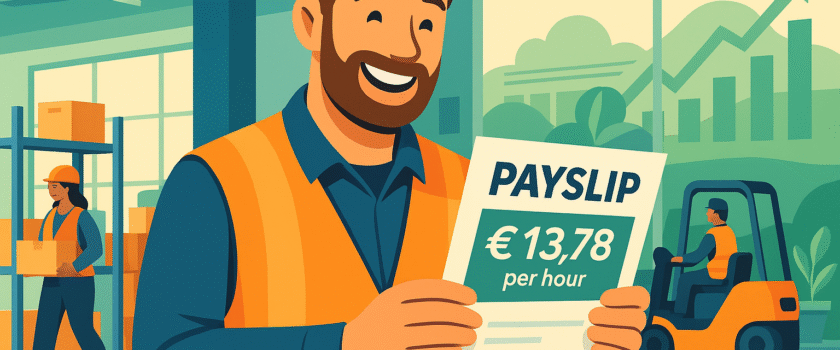
Minimum wage increase as of 1 July 2025: What does this mean for the staffing industry?
On 1 July 2025, the statutory minimum wage in the Netherlands will rise once again. This increase affects not only permanent employees but also flex workers and temporary staff. In addition, collectively agreed wages will be adjusted based on indexation, inflation and sector agreements. For companies and staffing agencies like Ebro Diensten, it is essential to anticipate these changes in time.
In this article, we explain what will change, how it will affect the staffing industry and how Ebro Diensten ensures a smooth and correct application of the new wage regulations.
What is changing as of 1 July 2025?
Since 1 January 2024, the Netherlands uses a statutory minimum hourly wage which replaced the former monthly wage system. This creates more transparency and fairness – regardless of the number of hours worked per week.
On 1 July 2025, the minimum hourly wage will be raised again. This semi-annual adjustment is standard and based on developments in collective agreements (CAOs).
According to preliminary estimates by the Ministry of Social Affairs and Employment, the new gross minimum hourly wage for employees aged 21 and older will be approximately €13.78 per hour. This may vary depending on the sector and applicable CAO scales.
Implications for the staffing industry
For staffing agencies and employers using flex workers, this wage increase has immediate consequences:
-
Payroll systems must be updated to reflect the new hourly rates
-
CAO wage scales for temporary workers (ABU or NBBU) will be revised
-
Prices and margins for clients may need to be adjusted
-
Pay slips and communications with flex workers must reflect the new rates accurately
For organisations like Ebro Diensten, this means not only legal compliance but also clear communication with both flex workers and clients.
CAO wage increases: double impact
In addition to the statutory wage, many sector-based CAO tables will also increase. In the staffing industry, we generally follow the ABU CAO, which is tied to the pay scales used by client companies.
This means that:
-
Wage increases in sectors such as logistics, production, food, cleaning and technology are directly passed on to flex workers
-
Lower wage brackets will see relatively larger increases
-
Differences between job levels may shrink
It is important to ensure that temporary workers remain properly classified in the correct scale and function group.
How Ebro Diensten prepares
At Ebro Diensten, we ensure that all our clients and flex workers are informed on time and correctly. Our approach includes:
-
Timely adjustment of all wage components in cooperation with payroll specialists
-
Clear communication to flex workers about their updated hourly rate
-
Advice to clients about the impact of wage changes on their pricing
-
Training for our consultants on the updated CAO structures
-
Verification of the correct application of the inlenersbeloning (client company pay rates)
In this way, we avoid misunderstandings, incorrect payments or administrative delays.
Opportunities and challenges
A higher minimum wage also means higher labour costs. This may seem like a disadvantage at first, but it also brings opportunities:
Advantages:
-
Increased purchasing power for flex workers → greater satisfaction and loyalty
-
Lower absenteeism and turnover
-
Improved employer reputation in a tight labour market
-
Reduced gap between permanent and flexible staff
Challenges:
-
Rising labour costs require margin adjustments
-
More pressure on payroll and planning systems
-
Greater need for monitoring legal and CAO compliance
At Ebro Diensten, we support businesses in finding the right balance: good employment practices combined with a healthy business model.
Transparency is key
Employees are entitled to fair pay, but this also requires clear communication. At Ebro Diensten, we believe transparency is essential for building sustainable relationships – with both employees and clients.
That’s why:
-
We provide full insight into gross wages and CAO scales at the start of each placement
-
Payslips are provided in understandable language
-
Our team is available to answer questions from flex workers
-
We proactively advise clients to ensure compliance
Change creates room for improvement
The increase in the minimum wage on 1 July 2025 is more than just a technical update. It’s a moment to reassess how we value work, optimise our processes and strengthen our partnerships.
Ebro Diensten is ready to guide all parties through the transition – from employers to the people who keep the economy moving every day.
Want to know how these changes will affect your organisation?
Get in touch, we’ll be happy to assist.

Share
Facebook
Twitter
LinkedIn
Telegram
Tumblr
WhatsApp
VK
Mail